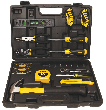Painting Kitchen Cabinets
Written by Lee Wyatt (last updated October 6, 2021)
The cabinets and fixtures in your kitchen are without doubt, subjected to more abuse, wear and tear than any other room in the house. Take your cabinets for example. Quite often, these wooden storage items are subjected to even more changes in environment than even the outside of your house is. With the wild fluctuations in temperature and humidity that we subject our kitchens to, is it any real surprise that these cabinets are going to need more frequent painting and repair than anything else in the house?
- Pick a color. The first step you need to take is to actually pick out the color you want your cabinets. Are they going to be the same color as before, or are you going to stain them this time? Which ever you do, take the time to think about it carefully, and actually take some color sample card home, and see if you would be able to live with the color before you make your final decision.
- Prep. After deciding the color of your cabinets, you really need to prep them. This means that you need to remove everything from the cabinets so that you can thoroughly clean the cabinets, and sand the old paint job off. If you want a truly professional appearance, then this job is vital. One of the easier ways to be able to prep everything is to remove the doors from the cabinets and work in pieces. Just be sure that you save all the hinges and screws for later reassembly. For the task of removing the old paint you want to use sandpaper that has a grit count of no more than 150. This is going to ensure that you are able to remove the old paint, with out damaging the wood itself. You are ready to move to the next step when everything is nice and smooth, with all the paint removed.
- Prime. While you don't actually need to use primer, it is the best way to ensure a long lived, and professional paint job. There is however, one instance where it is absolutely necessary to use primer, and that is if your cabinets were previously stained, and you are switching to paint. The primer allows the paint to adhere to the cabinet properly, while preventing the stain from bleeding through. Simply apply the primer as you would paint, and allow the primer to completely dry before proceeding to the next step.
- Paint. Considering how much work you have put into the project so far, you may simply want to slather it on and call it a day. While this may be the quickest way, it certainly is not the best. Use only a high quality paint brush that is 2 1/2" to 3" wide, or a sprayer that is on a similar setting and apply a very thin coat. Allow the coat to dry completely before proceeding to the next step.
- Coats. Once the first coat has completely dried, take some very fine sandpaper (about 400 grit or better) and run it very lightly over the surface of the cabinets. This takes out any inequalities in the previous coat, removes individual brushstrokes, etc. to ensure that the next coat has as smooth of a surface as possible to be painted on. After you have done this, apply the next coat. Repeat this step until you have reached the desired effect.
- Reassemble. Now that you have painted your cabinets it is time to reassemble everything and put your kitchen back together. Congratulations, you have completed painting your kitchen cabinets!
Author Bio
Lee Wyatt
Contributor of numerous Tips.Net articles, Lee Wyatt is quickly becoming a regular "Jack of all trades." He is currently an independent contractor specializing in writing and editing. Contact him today for all of your writing and editing needs! Click here to contact. Learn more about Lee...
Finding a Driving Instructor
The largest part of driver's education is finding an adequate driving instructor. Here is how you can find an exceptional ...
Discover More
Cleaning Stained Auto Glass
Over time auto glass has a tendency to become stained and etched, which makes it more difficult to see out of. If auto ...
Discover More
Fireplace Maintenance
For some reason most people have a tendency to forget about performing fireplace maintenance until it is way too late. ...
Discover More
More Home Improvement Tips
Painting New Drywall
Whether you are want to paint some renovation work or are trying to finish up some repairs, painting new drywall is an ...
Discover More
Properly Painting Your Room
Painting can be a really fun, and simple, home improvement project as long as you know what you are doing. Good thing ...
Discover More
Painting Aluminum Siding
Aluminum siding is an ever increasingly popular choice among homeowners for protecting their home. In large part this ...
Discover More

Comments